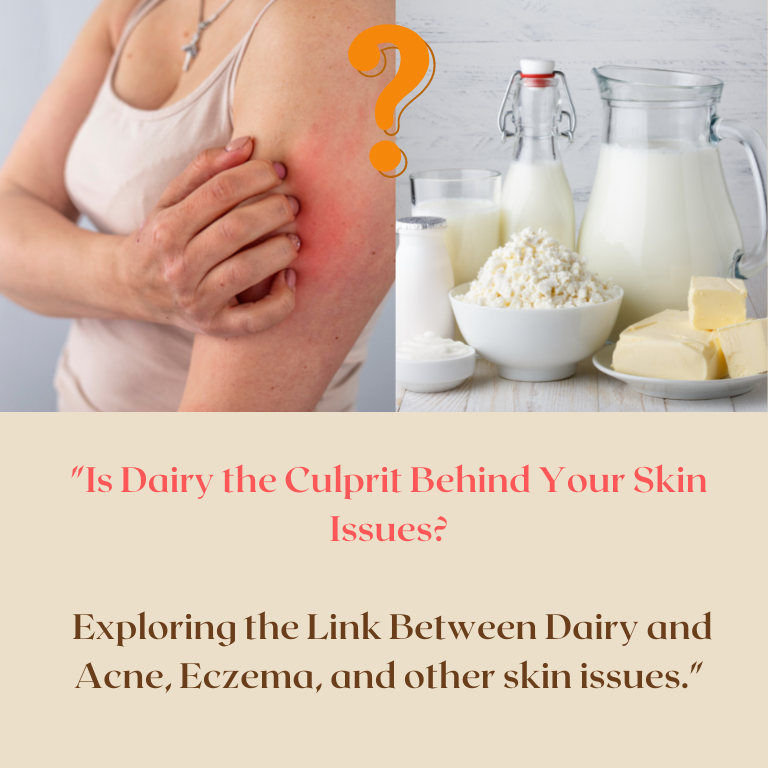
“Is Dairy the Culprit Behind Your Skin Issues? Exploring the Link Between Dairy and Acne, Eczema, and other skin issues.”
Dairy has been a topic of debate in the health and skincare community, with some experts suggesting that it can contribute to skin issues.
While there is no conclusive evidence that dairy causes skin issues, there are several reasons why it may be a contributing factor.
Firstly, dairy products such as milk, cheese, and yogurt are high in hormones!

Let me explain:
Dairy products such as milk, cheese, and yogurt contain hormones that are naturally produced by cows. These hormones include estrogen, progesterone, and insulin-like growth factor 1 (IGF-1). When humans consume dairy products, these hormones can enter our bodies and potentially disrupt our hormonal balance.
Estrogen and progesterone are hormones that are primarily associated with female reproductive health, but both men and women have these hormones in their bodies. When we consume dairy products that contain these hormones, it can affect the levels of estrogen and progesterone in our bodies. This can be particularly problematic for individuals who are sensitive to hormonal imbalances, as changes in hormone levels can lead to skin issues such as acne.
Hormonal acne is a common skin condition that occurs when there is an imbalance of hormones in the body. It is often associated with an excess of androgens, which are hormones that are typically more prevalent in men but also occur in women. However, consuming dairy products that contain estrogen and progesterone can also disrupt the hormonal balance in our bodies and potentially contribute to the development of hormonal acne.
Secondly, dairy products are also high in insulin-like growth factor 1 (IGF-This hormone is known to stimulate the production of sebum, which can clog pores and lead to acne.

Let’s look into this in detail:
Insulin-like growth factor 1 (IGF-1) is a hormone that is naturally produced by the body and is involved in a variety of cellular processes, including growth and development. Dairy products, particularly milk, are a major dietary source of IGF-1.
IGF-1 has been implicated in the development of acne, as it can stimulate the production of sebum, a natural oil that lubricates and protects the skin. Sebum is produced by the sebaceous glands, which are located just beneath the surface of the skin. When the production of sebum is increased, it can clog pores and lead to the development of acne.
Several studies have found a link between dairy consumption and acne, particularly in teenagers and young adults. For example, a 2018 study published in the Journal of the American Academy of Dermatology found that higher intakes of milk, particularly skim milk, were associated with an increased risk of acne in teenage boys.
While the relationship between IGF-1 and acne is not fully understood, it is believed that the hormone may play a role in increasing sebum production and inflammation in the skin. Additionally, IGF-1 may interact with other hormones in the body, such as androgens, which are also involved in the development of acne.
It’s important to note that not all dairy products contain the same levels of IGF-1, and the effect of dairy consumption on acne may vary depending on individual factors such as genetics and overall diet.
Thirdly, many people have lactose intolerance or a sensitivity to casein, which are the proteins found in milk.

Lactose intolerance is a condition in which the body is unable to fully digest lactose, the sugar found in milk and dairy products.
This is due to a deficiency in the enzyme lactase, which is responsible for breaking down lactose in the small intestine. As a result, lactose remains undigested in the digestive tract and can lead to uncomfortable symptoms such as bloating, gas, and diarrhoea.
In addition to lactose intolerance, some people may also be sensitive to casein, the protein found in milk. Casein sensitivity can lead to a variety of symptoms, including inflammation in the body, which can contribute to skin issues such as eczema, psoriasis, and acne.
Research has shown that inflammation in the body can contribute to the development of skin issues such as psoriasis, eczema, and acne. Inflammation is a natural response to injury or infection, but chronic inflammation can cause damage to tissues and cells, leading to a variety of health problems.
For individuals who have lactose intolerance or a sensitivity to casein, avoiding dairy products may be necessary to reduce inflammation in the body and improve skin health. Alternative sources of calcium and protein, such as fortified plant milks, leafy greens, nuts, and seeds, can be included in the diet to help meet nutrient needs.
Fourthly, dairy products are also high in saturated fat, which can contribute to inflammation in the body. Inflammation is a known trigger for skin issues such as acne, rosacea, and eczema.

Dairy products are a significant source of dietary saturated fat, which is a type of fat that is solid at room temperature. Saturated fat has been associated with inflammation in the body, as well as an increased risk of chronic diseases such as heart disease and type 2 diabetes.
Inflammation is a natural response of the body to injury or infection. However, when inflammation is chronic, it can contribute to the development of a variety of health issues, including skin issues such as acne, rosacea, and eczema.
Research has shown that a diet high in saturated fat can promote inflammation in the body, which can trigger or worsen skin issues. In addition, consuming a diet high in saturated fat can also affect the production of sebum, the oily substance that is produced by the skin’s sebaceous glands. An overproduction of sebum can clog pores and contribute to the development of skin issues such as acne.
Reducing dairy intake and choosing lower-fat dairy products can be a helpful strategy for reducing saturated fat intake and improving skin health. In addition, incorporating more anti-inflammatory foods into the diet, such as fruits, vegetables, whole grains, and healthy fats, can help to reduce inflammation in the body and improve overall health.
Finally, Antibiotic usage in the dairy industry!

Antibiotics are commonly used in the dairy industry to treat or prevent infections in cows. However, the overuse or misuse of antibiotics can lead to the development of antibiotic-resistant bacteria, which can be harmful to both cows and humans.
When antibiotics are used, they not only kill the harmful bacteria causing the infection, but also the beneficial bacteria in the cow’s gut. This can lead to an imbalance in the gut microbiome, which can result in inflammation and other health issues. The gut microbiome is closely linked to the immune system, and imbalances in the gut can have far-reaching effects on overall health, including skin health.
When humans consume dairy products that contain antibiotics, they can also be exposed to these antibiotic-resistant bacteria. This can lead to the development of antibiotic-resistant infections, which are difficult to treat with standard antibiotics and can pose a significant public health threat.
It’s crucial to keep in mind that while there are indications that dairy consumption can contribute to skin issues, it’s not a universal trigger. Some individuals may have a higher tolerance to dairy products and not experience any adverse skin effects.
If you suspect that dairy is impacting your skin health, it’s recommended to eliminate it from your diet and monitor the effects.
However, it’s essential to ensure that you maintain a well-balanced and nutritious diet with alternative sources of important nutrients.
I hope you liked this blog; don’t forget to like, share & subscribe. This will encourage me to make more informative content for you all.
If you or your loved one is dealing with any skin issue and you would like a holistic & natural treatment, I might be able to help you- email me at
contact@holisticskinwellness.com to discuss further.
